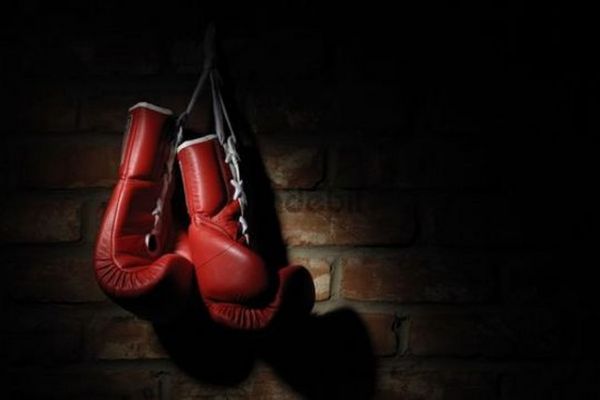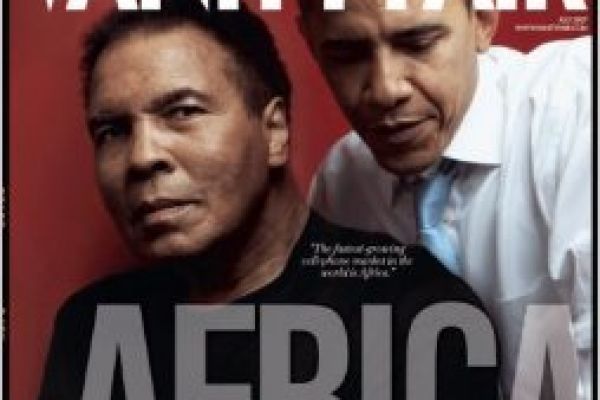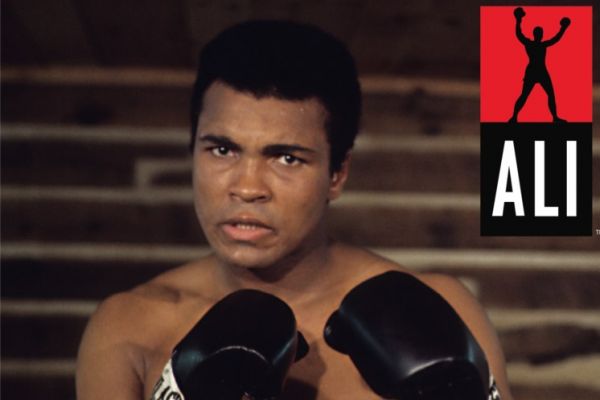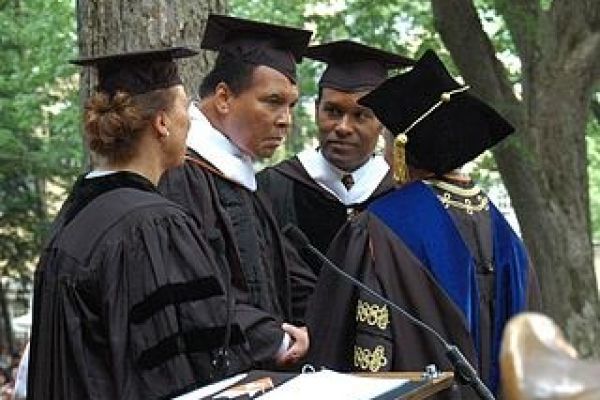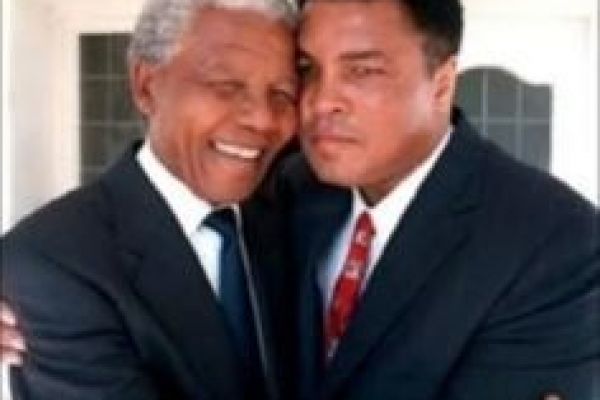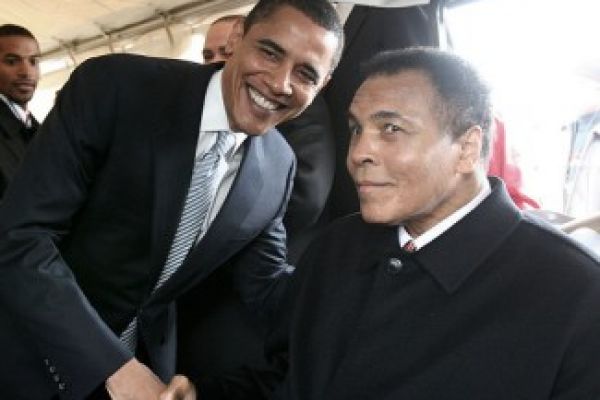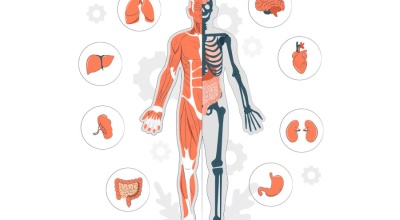An American professional boxer, nicknamed "The Greatest", Ali was involved in several historic boxing matches. In 2015, Ali released his memoir The Greatest: My Own Story, which chronicles the battles he faced in and out of the ring. It was edited by Nobel Prize-winning novelist Toni Morrison.
Notable among these boxing matches were the first Liston fight, three with rival Joe Frazier, and one with George Foreman, in which he regained titles he had been stripped of seven years earlier.
| Nickname(s) | The Greatest The People's Champion The Louisville Lip |
|---|---|
| Rated at | Heavyweight |
| Height | 6 ft 3 in (191 cm) |
| Reach | 78 in (198 cm) |
| Nationality | American |
| Born | Cassius Marcellus Clay, Jr. January 17, 1942 Louisville, Kentucky, U.S. |
| Died | June 3, 2016 (aged 74) Phoenix, Arizona, U.S. |
| Stance | Orthodox |
| Website | muhammadali.com |
Ranking in heavyweight history
Ali is generally considered to be one of the greatest heavyweights of all time by boxing commentators and historians. Ring Magazine, a prominent boxing magazine, named him number 1 in a 1998 ranking of greatest heavyweights from all eras.
Ali was named the second greatest fighter in boxing history by ESPN.com behind only welterweight and middleweight great Sugar Ray Robinson. In December 2007, ESPN listed Ali second in its choice of the greatest heavyweights of all time, behind Joe Louis.
The Associated Press voted Ali the No. 1 heavyweight of the 20th century in 1999.
In the media and popular culture
As a world champion boxer and social activist, Ali has been the subject of numerous books, films and other creative works.
Ali has appeared on the cover of Sports Illustrated on 37 different occasions, second only to Michael Jordan.
Ali had a cameo role in the 1962 film version of Requiem for a Heavyweight, and during his exile, he starred in the short-lived Broadway musical, Buck White (1969).
In 1963, Ali released an album of spoken word on Columbia Records titled I Am the Greatest, and in 1964, he recorded the song "Stand by Me".
Ali appeared in the documentary film Black Rodeo (1972) riding both a horse and a bull. His autobiography The Greatest: My Own Story, written with Richard Durham, was published in 1975. In 1977 the book was adapted into a film called The Greatest, in which Ali played himself and Ernest Borgnine played Angelo Dundee.
The film Freedom Road, made in 1978, features Muhammad Ali in a rare acting role as Gideon Jackson, an ex-slave in 1870s Virginia who gets elected to the U.S. Senate in Washington, D.C., and battles other former slaves and white sharecroppers to keep the land they have tended all their lives. On the set of Freedom Road Ali met Canadian singer-songwriter Michel, and subsequently helped create Michel's album entitled The First Flight of the Gizzelda Dragon. and the hour-long television show With Love From Muhammad Ali.
Ali was the subject of This Is Your Life in 1978 when he was surprised by Eamonn Andrews.
In 1979, Ali guest-starred as himself in an episode of the NBC sitcom Diff'rent Strokes.
The Muhammad Ali Effect, named after Ali, is a term that came into use in psychology in the 1980s, as he stated in his autobiography The Greatest: My Own Story: "I only said I was the greatest, not the smartest." According to this effect, when people are asked to rate their intelligence and moral behavior in comparison to others, people will rate themselves as more moral, but not more intelligent than others.
When We Were Kings, a 1996 documentary about the Rumble in the Jungle, won an Academy Award, and the 2001 biopic Ali garnered an Oscar nomination for Will Smith's portrayal of the lead role.[148] The latter film was directed by Michael Mann, with mixed reviews, the positives given to Smith's portrayal of Ali. Prior to making the film, Smith rejected the role until Ali requested that he accept it. Smith said the first thing Ali told him was: "Man you're almost pretty enough to play me."
In 2002, for his contributions to the entertainment industry, Ali was honored with a star on the Hollywood Walk of Fame at 6801 Hollywood Boulevard.[150] His star is the only one to be mounted on a vertical surface, out of deference to his request that his name not be walked upon.
The Trials of Muhammad Ali, a documentary directed by Bill Siegel that focuses on Ali's refusal of the draft during the Vietnam War, opened in Manhattan on August 23, 2013. A made-for-TV movie called Muhammad Ali's Greatest Fight, also in 2013, dramatized the same aspect of Ali's life.
Muhammad Ali receives an honorary doctorate from the Princeton University
Doctor of Humanities
Muhammad Ali became the first boxer to win the world heavyweight title three times. His career started when, at 18, he won a gold medal in the 1960 Olympics with a style that challenged the game's sacred teachings. In 1961, he beat Sonny Liston in a fight that first gained him the world heavyweight title and that has been credited with restoring intelligence and balance to boxing. As a member of the Muslim faith and a conscientious objector, Ali refused to serve in the Vietnam War when drafted and was stripped of his titles and his license to fight in many states. In 1971, the U.S. Supreme Court upheld his status as a conscientious objector. He regained his world heavyweight title in 1974, defeating George Foreman. He dethroned Leon Spinks in 1978 to win the title for the third time. When Ali retired in 1981, his career record stood at 56-5, with 37 knockouts. Read More ...



